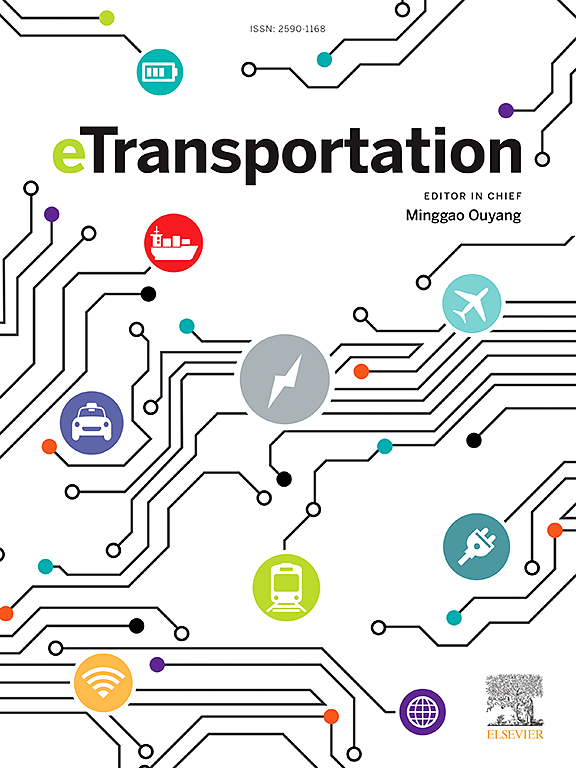电动汽车锂离子电池管理系统中的高级数据驱动故障诊断:进展、挑战和未来展望
IF 17
1区 工程技术
Q1 ENERGY & FUELS
引用次数: 0
摘要
电动汽车(EV)在运行、老化或充电过程中的危险往往来自锂离子电池组(LIB)。强大的早期故障诊断算法对于提高安全性、效率和可靠性至关重要。锂离子电池故障类型涉及内部电池、传感器、执行器和系统故障,由电池管理系统(BMS)管理,该系统负责处理状态估计、电池平衡、热管理和故障诊断。及时识别和隔离故障电池,并采取早期预警措施,对安全性至关重要。本综述探讨了用于 LIB 管理系统故障诊断的数据驱动方法,内容包括实施、分类、故障类型和特征提取。它还讨论了 BMS 的作用、传感器类型、挑战和未来趋势。研究结果旨在指导研究人员和汽车行业推进故障诊断方法,以支持可持续的电动汽车交通。本文章由计算机程序翻译,如有差异,请以英文原文为准。
Advanced data-driven fault diagnosis in lithium-ion battery management systems for electric vehicles: Progress, challenges, and future perspectives
Hazards in electric vehicles (EVs) often stem from lithium-ion battery (LIB) packs during operation, aging, or charging. Robust early fault diagnosis algorithms are essential for enhancing safety, efficiency, and reliability. LIB fault types involve internal batteries, sensors, actuators, and system faults, managed by the battery management system (BMS), which handles state estimation, cell balancing, thermal management, and fault diagnosis. Prompt identification and isolation of defective cells, coupled with early warning measures, are critical for safety. This review explores data-driven methods for fault diagnosis in LIB management systems, covering implementation, classification, fault types, and feature extraction. It also discusses BMS roles, sensor types, challenges, and future trends. The findings aim to guide researchers and the automotive industry in advancing fault diagnosis methods to support sustainable EV transportation.
求助全文
通过发布文献求助,成功后即可免费获取论文全文。
去求助
来源期刊

Etransportation
Engineering-Automotive Engineering
CiteScore
19.80
自引率
12.60%
发文量
57
审稿时长
39 days
期刊介绍:
eTransportation is a scholarly journal that aims to advance knowledge in the field of electric transportation. It focuses on all modes of transportation that utilize electricity as their primary source of energy, including electric vehicles, trains, ships, and aircraft. The journal covers all stages of research, development, and testing of new technologies, systems, and devices related to electrical transportation.
The journal welcomes the use of simulation and analysis tools at the system, transport, or device level. Its primary emphasis is on the study of the electrical and electronic aspects of transportation systems. However, it also considers research on mechanical parts or subsystems of vehicles if there is a clear interaction with electrical or electronic equipment.
Please note that this journal excludes other aspects such as sociological, political, regulatory, or environmental factors from its scope.
 求助内容:
求助内容: 应助结果提醒方式:
应助结果提醒方式:


